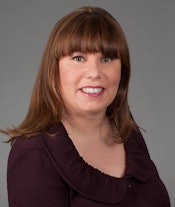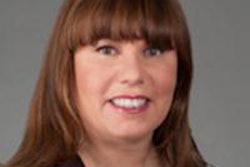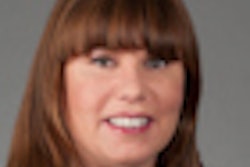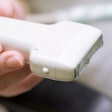
When I survived the harrowing trip to Louisville, KY, and actually passed my board, my mother had a T-shirt made that proclaimed "I passed my boards." I never wore it, but kept it for decades, as a reminder of the relief I felt crossing that milestone to adulthood in radiology. Never to return to Louisville again, except maybe for a mint julep or two.
Well, not long after, the lifetime status of board certification changed and that sense of complete relief would never be again felt by emerging radiologists. Facing the very real need to ensure continuing competency, recertification every 10 years is the norm under the American Board of Radiology (ABR) Maintenance of Certification (MOC) policy.
 Dr. Mary Morrison Saltz.
Dr. Mary Morrison Saltz.
The new MOC policy doesn't apply to those of us who were board-certified in diagnostic radiology before 2002. For those of us who don't have to recertify, taking the step to recertify voluntarily is a challenge.
But MOC is not a dirty word. To stay ahead of the curve, MOC has become very important. It is a key part of staying current -- showing the world that as a profession, we "get it" and have the credentials to prove it, even if we finished training a while ago.
The reality is that we need to ensure that, as a profession, we have standards and make sure that our colleagues are all of sufficient quality to be called radiologists. This means standards, checks and balances, and transparency.
What do we have and use today to make sure we do the right thing? We have board exams, decertification, and peer review. In any practice, we need transparency to assuage the fears of others that our department may not be up to snuff. It is now upon us to prove we are doing the right thing, before we are asked.
We all have to pass the board exam, a rite of passage, to have the calling card to call ourselves radiologists. We have to keep and renew that certification. We have to do peer review.
This can be, and is, legislated by outside bodies, but it is something we actually need to embrace as well.
We are not above reproach, neither as a profession nor as individuals. As humans and physicians, we err and as a profession we need to deal with this. We should try to identify and eliminate the real bad eggs, and support and educate the rest, to maintain our high professional standards. We should strive for perfection as our goal, even while understanding that it can only be asymptotically reached.
By achieving board certification, we place a floor underneath us -- those who reach those standards and those who don't. This system is not perfect, but the ABR has been doing just this since 1934 -- just around the time my Uncle Hugh was team radiologist to the Manchester United "football" team in England.
At the same time, radiology is not static. The demands upon us grow and morph over time, and as a profession we must be willing to embrace this.
It is fascinating to look at our history and the necessary changes over time to allow a useful quality standard. Below is the list of outdated certificates once issued by the ABR but are now no longer offered, as taken from its website. Just think how out of date we would be if we did not change with the times.
- Diagnostic Radiology with Special Competence in Nuclear Radiology, 1973-1998
- Diagnostic and Nuclear Medical Physics, 1976-1998
- Diagnostic Roentgenology, 1934-1969
- Nuclear Medicine, 1955-1966
- Radiologic Physics, 1947-1997
- Radiology, 1934-1989
- Radium Therapy, 1934-1960
- Roentgenology, 1934-1961
- Roentgen Ray & Gamma Ray Physics, 1961-1975
- Therapeutic and Diagnostic Medical Physics, 1973-1997
- Therapeutic and Nuclear Medical Physics, 1976-1992
- Therapeutic Roentgenology, 1935-1954
- X-Ray and Radium Physics, 1947-1960
Note: The certificate formerly called Therapeutic Radiology is now called Radiation Oncology.
The MOC is part of the ABR's effort to ensure that our specialty is up to date and able to keep up with the challenges of the changing field in which we work. Recertification keeps a level playing field, and shows that seasoned radiologists are not getting older, just getting better! The bottom line is that all of us have to embrace the opportunity to show that we have everything it takes to stay competitive and get the job done.
We have a real floor under us -- our board certificates. They show the world that we have what it takes to do our jobs. But does it show that we are really doing them well?
If you're not one of the radiologists who have to face MOC, peer review is a great tool that we can use every day to help prove to ourselves and the world that we are doing it right. We can use home-brewed peer review, or rely on our American College of Radiology (ACR) colleagues to help with RadPeer, but no matter how we do it, we MUST do it! It provides proof positive that we look at ourselves and our mistakes. We need to do peer review, keep these records, and make transparent our results compared with a national norm.
So the next time you are asked to please do your peer-review cases -- don't scream and yell at the person who was brave enough to ask. Just DO it, don't complain, and be grateful you have the opportunity to show the world how good we really are!
Dr. Mary Morrison Saltz is a board-certified diagnostic radiologist who is currently the chief medical officer for Hospital Radiology Partners, a national radiology contract management and consulting company based in Atlanta.
She has served as radiology chair and service chief at hospitals in Florida, Ohio, and most recently at Emory Johns Creek Hospital in Johns Creek, GA. Dr. Saltz is a member of the American College of Physician Executives, the American College of Radiology, and the Radiological Society of North America, and she sits on the Citizens Advisory Council of the Duke Cancer Institute in Durham, NC.
Dr. Saltz has more than two decades of experience in turning around problem radiology departments in three states. As a hands-on leader, Dr. Saltz's expertise is working hand-in-hand with hospital administration to guide the radiology teams to success. Dr. Saltz has led quality assurance programs in Florida and Ohio, and served as chief quality officer for community practice initiatives at Emory Health Care. She also has more than 20 years of private practice experience.
She is a graduate of McGill University, with a Bachelor of Science in Human Genetics, and Duke University, where she obtained her Doctor of Medicine. Her postgraduate education included a residency at Boston University where she served as chief resident, and a fellowship in interventional abdominal radiology at Massachusetts General Hospital.
The comments and observations expressed herein do not necessarily reflect the opinions of AuntMinnie.com, nor should they be construed as an endorsement or admonishment of any particular vendor, analyst, industry consultant, or consulting group.



















